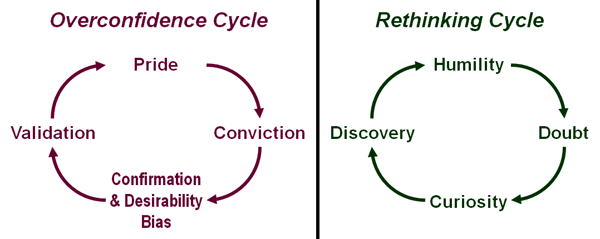Graduate studies in business avail themselves of case studies to stimulate thought and discussion among budding corporate magnates. Some shine a light on success stories to provide exemplars of strategically sound thinking. Others highlight epic failures. The horse-and-buggy manufacturers who failed to take horseless carriages (a.k.a., automobiles) seriously. The purveyors of Encyclopedia Britannica who believed parents would continue to invest in their meticulously researched, gloriously illustrated tomes when personal computers hit the scene. The Blackberry CEO who held fast to miniature keyboards on his devices in lieu of touch screens.
While we may not carry the weight of corporate strategy on our shoulders, we are certainly vulnerable to mental miscalculation. Habitual patterns of thought may weigh us down, stifle our creativity, disrupt relationships, and render us blind to opportunities, dangers, and roadblocks – especially in a world that changes rapidly. Adam Grant illumes a path to mental agility in his book Think Again: The Power of Knowing What You Don’t Know.
Most of us take pride in our knowledge and expertise. In fact, the more often our intellectual horsepower has proven right, the less likely we are to question our mental processes, and the more difficult it is to pivot in response to new information or insights. In our conviction that we’re right, we receive data through a distorted lens. Our confirmation bias leads us to focus on that which affirms what we already believe to be true. Our desirability bias gives greater weight to that which we want to be true. Both validate our established notions and feed into the sense of pride that kicked the cycle off. In reality, we are all wrong more often than we’d like to admit!
When we commit to being flexible and open-minded in our thought patterns, we proceed from a place of humility. We may be confident in our ability to process data and exercise sound judgment, but we’re open to the possibility that our thought processes may not reveal the best interpretations, conclusions, or solutions. We allow ourselves to be curious about a subject or issue and engage enthusiastically on a journey of discovery. This exercise alerts our minds to the vast sea of knowledge and perspectives over which we are not masters. It keeps us humble, interested, and open.
So, what advice does Adam offer to keep our minds nimble?
- Locate your identity in your core values, not your opinions. You’ll gain intellectual flexibility when your sense of self is not tied to a need to be right.
- Think like a scientist. Treat opinions like hypotheses that need to be tested and proven true (or false) with hard data.
- Don’t confuse confidence with competence. You can hold your mental skills and capacity to learn in high regard while questioning your current thinking on a subject or problem.
- Engage actively with facts and opinion pieces that challenge your sensibilities. Lend them a sympathetic ear and see how they inform your perspective.
- Be OK with being wrong – in fact, celebrate it! It means you’ve learned something and will invite self-improvement in whatever form it takes. As Thomas Edison was reputed to have said: “I didn’t fail. I just found 2,000 ways not to make a lightbulb. I only needed to find one way to make it work.”
- Don’t shy away from constructive conflict. Rather, welcome people into your orbit with whom you regularly disagree. We learn more from people who challenge us than we do folks with whom we share points of view! Make sure your rules of engagement call for mutual respect. Try framing discussions as scholastic debates in service of a spirit of discovery. You might even take the opportunity to argue in favor of a side that you oppose initially to stretch your capacity to see things from multiple points of view.
A final thought from Adam sums it up for me:
“Every time we encounter new information, we have a choice. We can attach our opinions to our identities and stand our ground in the stubbornness of preaching and prosecuting. Or we can operate more like scientists, defining ourselves as people committed to the pursuit of truth – even if it means proving our own views wrong.”
